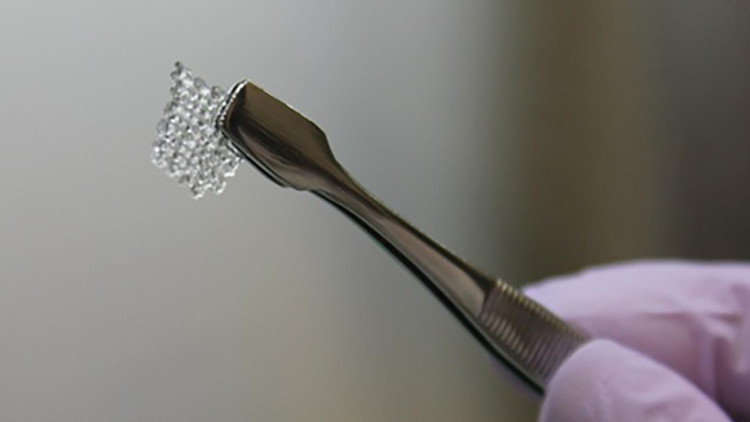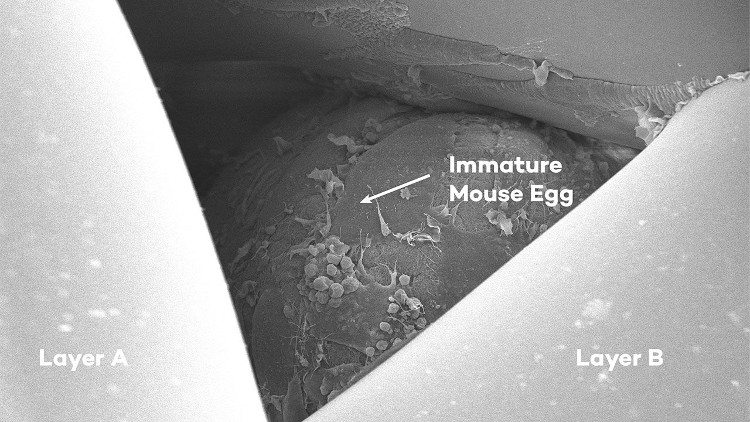3D print ovaries provide hope for infertile women
Scientists have printed the ovaries and used them to create healthy offspring. This is said to be the 'holy grail' of biotechnology.
For the first time in the world, US researchers have created an artificial ovary and implanted it into mice, created eggs, successfully fertilized, produced healthy mice.

Future ovaries for infertile people due to cancer chemotherapy and other problems - (Photo: Northwestern University).
Although this process has so far only been tested in animals, the long-term goal is to help restore fertility and hormone production in women who have undergone chemotherapy and have problems. Other infertility such as polycystic ovaries.
Dr. Teresa Woodruff - Reproductive science researcher, Director of the Women's Health Research Institute, Northwestern University (Illinois), said: "The real breakthrough here is that we can build an ovary that can restore fertility for young cancer patients affected by treatment. Hope this will be the ovaries of the future. '
Fake ovaries are printed with gelatin liquid made of collagen, a natural substance found in ligaments, tendons, muscles, bones and skin.

Rat eggs grow well in fake ovaries - (Photo: Northwestern University).
In Nature Communications, scientists say the ovary is designed to have a grid-like pore structure, so they can interact with muscle tissue and activate egg production, while also strong enough for transplant surgeons.
The structure allows egg cells to mature and ovulate, as well as blood vessels that form in the implant to help the hormone circulate in the blood and activate lactation after birth.
Dr. Monica Laronda added that the team is currently working to expand this ovary so that it can be tested on larger animals, and ultimately humans. But Martin Ledwick, from the British Cancer Research Center, said: "Preserving fertility is an important issue for many patients whose treatment can make them infertile. However, until now this work is only done on mice, so it is unclear whether it will be useful for people in the future. "
According to Cancer Research UK, about 24,000 women of childbearing age are diagnosed with cancer in the UK every year. Many cancer treatments can affect fertility because women are born along with all their eggs and cannot produce more if they are damaged. In some cases, chemotherapy may cause infertility and premature menopause.

The mice were transplanted with artificial ovaries to give birth to healthy babies - (Photo: Northwestern University).
In fact, women can choose embryos, eggs or ovarian tissue and freeze before treatment, but this option is also quite difficult if ovarian cancer and breast cancer are present. It may take several weeks to stimulate the ovaries and collect eggs while the oncologists always want women to begin treatment immediately when they detect the disease.
But recent research by the University of Edinburgh found that, in one case, a combination drug used for lymphoma actually triggered the development of new eggs.
The finding comes after scientists found that women who underwent chemotherapy had 10 times more eggs than healthy women. The team guesses that chemotherapy shock can trigger stem cells in the ovaries to produce new follicles.
- New breakthrough helps infertile women have children
- Detection of breakthroughs in female ovaries
- New method of treating infertility for women
- Fatty is related to infertility
- Implants for infertile women
- Breakthroughs help women who don't have a uterus give birth
- Successful breeding of sperm in vitro
- People with polycystic ovaries are prone to heart disease
- Women aged 30 decline fertility
- Good news for infertile people: Finding a way to recover eggs 'bad'
- Find out the solution to the mystery of orgasm in women
- Kissing can infect the virus causing infertility?
 Green tea cleans teeth better than mouthwash?
Green tea cleans teeth better than mouthwash? Death kiss: This is why you should not let anyone kiss your baby's lips
Death kiss: This is why you should not let anyone kiss your baby's lips What is salmonellosis?
What is salmonellosis? Caution should be exercised when using aloe vera through eating and drinking
Caution should be exercised when using aloe vera through eating and drinking